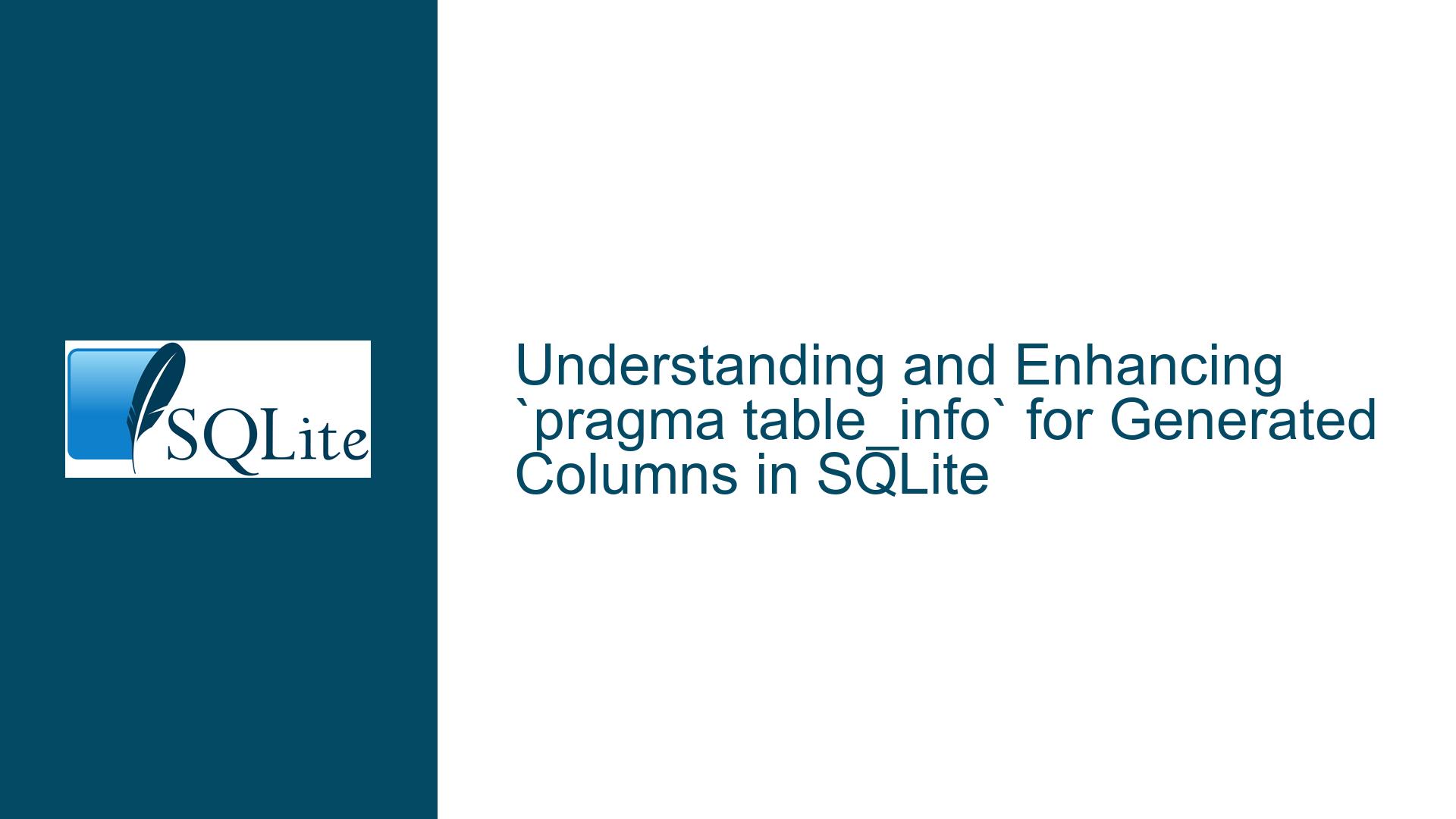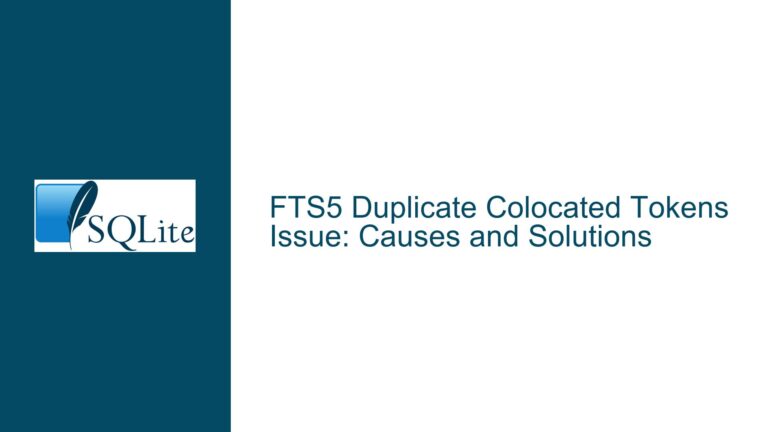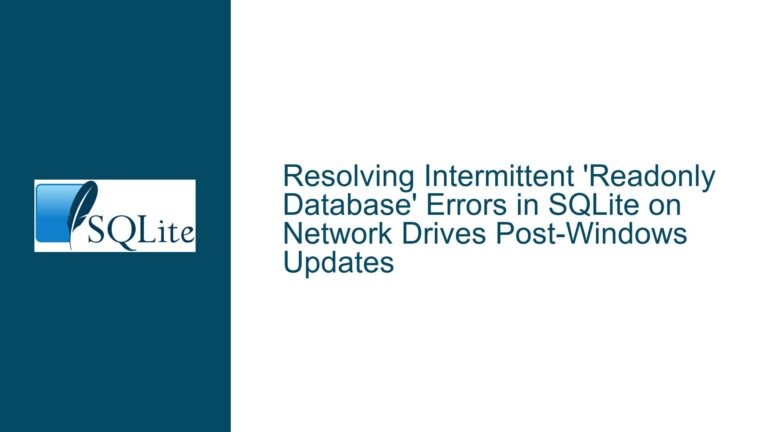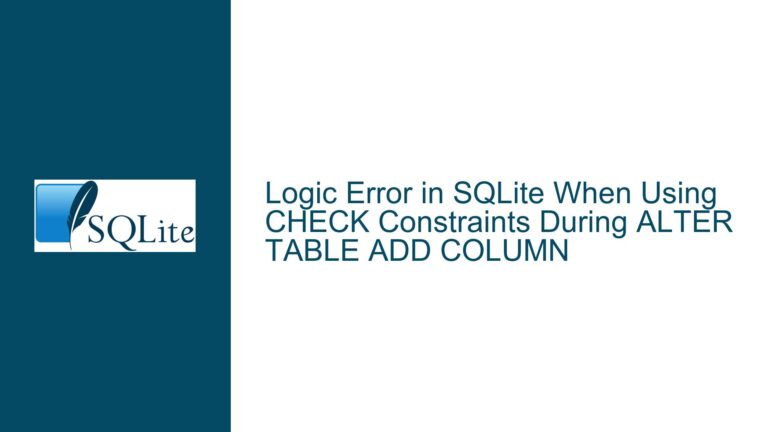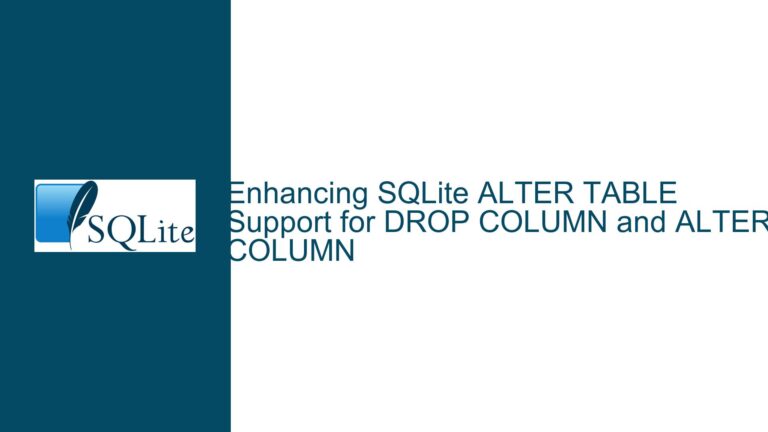and Enhancing `pragma table_info` for Generated Columns in SQLite
Issue Overview: Denormalized type Column in pragma table_info for Generated Columns
The core issue revolves around the behavior of the pragma table_info command in SQLite when dealing with generated columns. Specifically, the type column in the output of pragma table_info includes the full definition of generated columns, such as integer generated always, which is considered denormalized. This behavior is problematic because the type column is traditionally expected to contain only the data type of the column, such as integer, text, or real. The inclusion of additional keywords like generated always in the type column deviates from this expectation and complicates the interpretation of the schema metadata.
Generated columns in SQLite are a powerful feature that allows columns to be computed based on expressions involving other columns in the same table. These columns can be either VIRTUAL (computed on-the-fly when queried) or STORED (computed and stored physically in the database). The current implementation of pragma table_info does not provide a clear or structured way to distinguish between these types of generated columns or to access the expression used to generate them. Instead, it lumps all this information into the type column, which is not ideal for programmatic access or schema introspection.
The denormalization of the type column poses several challenges. First, it makes it difficult to parse the column type programmatically, as the type field now contains a mix of data type information and generation semantics. Second, it obscures the distinction between regular columns and generated columns, which is crucial for understanding the schema and its constraints. Third, it limits the ability to extract the generation expression, which is essential for debugging, documentation, and schema migration purposes.
The discussion highlights a desire for enhancements to pragma table_info to include additional columns that explicitly indicate whether a column is generated, whether it is VIRTUAL or STORED, and what the generation expression is. These enhancements would make the schema metadata more structured, easier to parse, and more informative, aligning better with the needs of developers and tools that rely on SQLite’s schema introspection capabilities.
Possible Causes: Design Limitations and Historical Context of pragma table_info
The denormalized type column in pragma table_info for generated columns can be attributed to several factors, including design limitations, historical context, and the evolution of SQLite’s feature set. Understanding these causes is essential for appreciating why the current behavior exists and why it might be challenging to change.
First, pragma table_info is one of SQLite’s oldest and most widely used schema introspection tools. It was designed long before generated columns were introduced in SQLite 3.31.0. At the time of its creation, the type column was intended to store only the data type of the column, such as integer, text, or real. The introduction of generated columns introduced new metadata that did not fit neatly into the existing schema introspection framework. Rather than overhauling pragma table_info or introducing a new pragma, the SQLite developers opted to extend the type column to include the additional information. This decision was likely made to maintain backward compatibility and minimize disruption to existing applications.
Second, the design of pragma table_info reflects SQLite’s philosophy of simplicity and minimalism. Adding new columns to the output of pragma table_info would increase its complexity and potentially break existing code that relies on the current structure. For example, tools and libraries that parse the output of pragma table_info might assume a fixed number of columns or a specific format for the type field. Changing this structure could require updates to these tools, which might not always be feasible.
Third, the current implementation of pragma table_info is consistent with SQLite’s approach to schema metadata. SQLite stores schema information in the sqlite_schema table, which uses a single sql column to store the full CREATE TABLE statement for each table. This approach is simple and flexible but can make it difficult to extract specific pieces of metadata, such as whether a column is generated or what its generation expression is. The denormalized type column in pragma table_info can be seen as a reflection of this broader design philosophy.
Finally, the lack of explicit support for generated columns in pragma table_info may also be due to the relatively recent introduction of this feature. Generated columns were added in SQLite 3.31.0, which was released in January 2020. It is possible that the SQLite developers have not yet had the opportunity to fully integrate this feature into the schema introspection tools. As generated columns become more widely used, there may be increasing pressure to enhance pragma table_info to better support them.
Troubleshooting Steps, Solutions & Fixes: Enhancing pragma table_info for Generated Columns
To address the issues with pragma table_info for generated columns, several steps can be taken to enhance its functionality and make it more suitable for modern use cases. These steps include proposing changes to the output format of pragma table_info, exploring alternative schema introspection methods, and providing workarounds for the current limitations.
Proposing Changes to pragma table_info
The most straightforward solution is to enhance pragma table_info to include additional columns that explicitly indicate whether a column is generated, whether it is VIRTUAL or STORED, and what the generation expression is. This would involve adding the following columns to the output of pragma table_info:
generated: A boolean column indicating whether the column is generated.generation_type: A text column indicating whether the column isVIRTUALorSTORED.generation_expression: A text column containing the expression used to generate the column.
These changes would make the output of pragma table_info more structured and easier to parse, while also providing more detailed metadata about generated columns. For example, the output for a generated column might look like this:
cid | name | type | notnull | dflt_value | pk | generated | generation_type | generation_expression
----|------------|---------|---------|------------|----|-----------|-----------------|----------------------
0 | full_name | text | 0 | NULL | 0 | 1 | VIRTUAL | first_name || ' ' || last_name
This enhanced output would allow developers and tools to easily distinguish between regular columns and generated columns, determine the type of generation, and access the generation expression.
Exploring Alternative Schema Introspection Methods
While enhancing pragma table_info is the most direct solution, it is also worth exploring alternative methods for introspecting generated columns in SQLite. One such method is to query the sqlite_schema table directly. The sqlite_schema table contains the full CREATE TABLE statement for each table, which includes the definitions of generated columns. By parsing this statement, it is possible to extract detailed metadata about generated columns, including their type, generation type, and generation expression.
For example, the following query can be used to extract the definition of a generated column:
SELECT sql
FROM sqlite_schema
WHERE type = 'table' AND name = 'your_table_name';
The output of this query will include the full CREATE TABLE statement, which can be parsed to extract the relevant metadata. While this approach requires more effort than using pragma table_info, it provides a more flexible and powerful way to introspect the schema.
Another alternative is to use the sqlite_master table, which is similar to sqlite_schema but includes additional metadata about the database schema. By querying sqlite_master, it is possible to extract detailed information about generated columns, including their definitions and dependencies.
Providing Workarounds for Current Limitations
In the absence of enhancements to pragma table_info, there are several workarounds that can be used to introspect generated columns in SQLite. One such workaround is to use a combination of pragma table_info and sqlite_schema to extract the necessary metadata. For example, the following steps can be used to determine whether a column is generated and to extract its generation expression:
- Use
pragma table_infoto get the basic metadata for each column, including thetypefield. - Parse the
typefield to determine whether it contains the keywordsgenerated always. - If the column is generated, query
sqlite_schemato extract the fullCREATE TABLEstatement. - Parse the
CREATE TABLEstatement to extract the generation expression and determine whether the column isVIRTUALorSTORED.
While this workaround is more complex than using an enhanced version of pragma table_info, it provides a way to access the necessary metadata without waiting for changes to SQLite itself.
Another workaround is to use a custom SQL function or script to parse the output of pragma table_info and extract the relevant metadata. For example, a Python script could be written to parse the type field and extract the generation expression, generation type, and other metadata. This approach requires more effort but provides a flexible and customizable way to introspect generated columns.
Conclusion
The denormalized type column in pragma table_info for generated columns is a limitation that complicates schema introspection in SQLite. While the current behavior is a result of historical design decisions and the evolution of SQLite’s feature set, there are several steps that can be taken to address this issue. Enhancing pragma table_info to include additional columns for generated columns is the most straightforward solution, but alternative methods such as querying sqlite_schema or using custom scripts can also be effective. By understanding the causes of this issue and exploring potential solutions, developers can better navigate the challenges of working with generated columns in SQLite.
